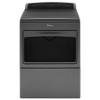Whirlpool WGD7500GC W11040073A Whirlpool Agora Dryer - Page 4
Check Your Vent System For Good Airflow
 |
View all Whirlpool WGD7500GC manuals
Add to My Manuals
Save this manual to your list of manuals |
Page 4 highlights
Check Your Vent System For Good Airflow Maintain good airflow by: ■■ Cleaning your lint screen before each load. ■■ Replace plastic or foil vent material with 4" (102 mm) diameter heavy, rigid vent material. ■■ Use the shortest length of vent possible. ■■ Use no more than four 90° elbows in a vent system; each bend and curve reduces airflow. Good Better Good airflow Along with heat, dryers require good airflow to efficiently dry laundry. Proper venting will reduce your drying times and improve your energy savings. See Installation Instructions. The venting system attached to the dryer plays a big role in good airflow. Blocked or crushed vents as well as improper venting installation will reduce airflow and dryer performance. Service calls caused by improper venting are not covered by the warranty and will be paid by the customer, regardless of who installed the dryer. To clean or repair venting, contact a venting specialist. ■■ Remove lint and debris from the exhaust hood. ■■ Remove lint from the entire length of the vent system at least every two years. When cleaning is complete, be sure to follow the Installation Instructions supplied with your dryer for final product check. ■■ Clear away items from the front of the dryer. What To Dry and How To Dry? for better fabric care and energy savings. By answering these questions, you can achieve the most energy savings and enhanced fabric care from your dryer. Using these automatic cycles, the drying air temperature and moisture levels are sensed in the load. This sensing process occurs throughout the entire drying cycle and turns off once the load reaches your selected dryness level. Using a dryness level between Less and More provides the optimal energy savings. If Timed Dry is your answer, the dryer runs for the amount of time you select, which sometimes results in shrinkage, wrinkling, and static due to overdrying. Use Timed Dry for the occasional damp load that needs a little more drying time or when using the drying rack. 4













